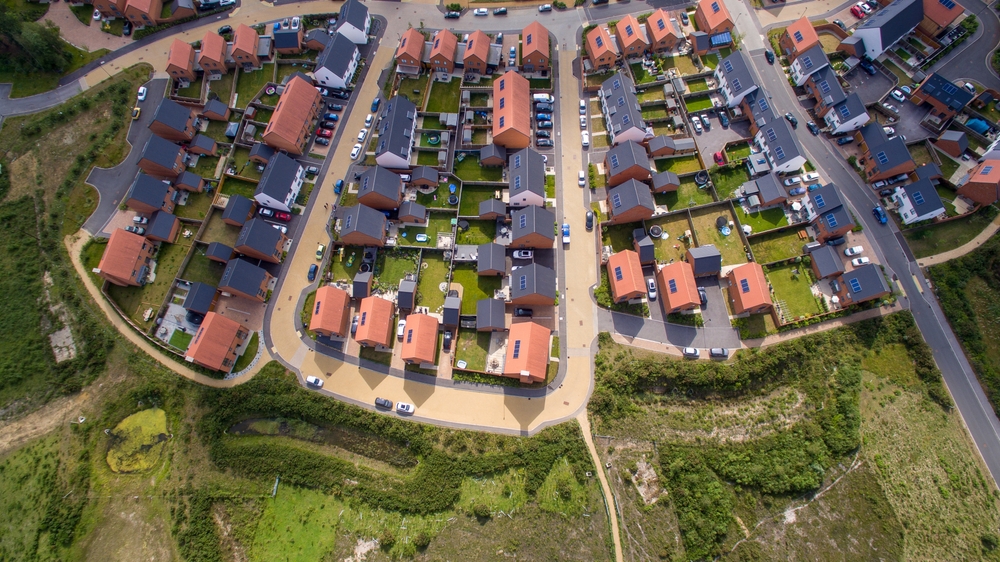

Our monthly property market review is intended to provide background to recent developments in property markets as well as to give an indication of how some key issues could impact in the future.
We are not responsible or authorised to provide advice on investment decisions concerning property, only for the provision of mortgage advice.
Housebuilding in England has dropped to its lowest level since 2017, excluding the pandemic period, with just 217,911 new homes completed in 2024.
This marks a 6% decline from 2023’s total of 231,000 and continues a four-quarter trend of falling completions, according to Energy Performance Certificate (EPC) data. Completions have slowed across all tenures and builder sizes, though affordable housing has remained relatively stable. Planning delays remain a major obstacle, with 88% of developers citing them as a constraint, according to the Home Builders Federation (HBF).
Beyond delays, the number of homes gaining planning consent remains low. Around 245,000 homes were approved in 2024, in line with 2023, but well below the 370,000 needed annually. While permissions outpaced completions by 12%, the supply gap continues to widen, restricting growth.
Edinburgh has kept its position as the UK’s top city for residential investment, according to Colliers’ analysis.
The top four cities – Edinburgh, Glasgow, Manchester and London – were unchanged, while Reading climbed six places to fifth, driven by strong start-up growth and a projected 2.5% annual gross domestic product (GDP) increase. Reading also leads in leisure facilities, making it an attractive investment location.
Andrew White, Colliers’ Head of Residential, said, “After a number of years of turbulence and macroeconomic challenges, it’s interesting for investors to observe that there’s been a period of stability in the UK housing market, with locations that have been sure investments in recent times remaining at the top. The Scottish cities are continuing to top our ranking, most likely due to the affordability and strong economic qualities of the region, as well as the quality-of-life indicators we consider.”
Investor sentiment in the regional office market has improved, with total investment reaching £2.9bn in 2024, up 10% from 2023, according to Savills.
The Big Six regional cities saw office take-up of 4.6 million sq. ft, 15% above the five-year average and the highest since 2019. Opportunistic investors are targeting repriced assets with strong fundamentals. Overseas investors led the market, accounting for 41% of investment, with French SCPI funds particularly active. Property companies remain key players, representing 32% of investment volumes and many acquisitions are set for alternative use conversion.
Despite macroeconomic uncertainty, corporate occupiers continue to pay premium rents, with prime rental growth in Greater London and the South East up 8% in 2024. On average, tenants relocating to Grade A offices are paying 69% higher rents per sq. ft than on previous leases, reinforcing the ongoing flight to quality.
New research from Dutton Gregory highlights key trends in remote work, property valuations and sustainability upgrades.
Remote working poses the greatest challenge in the commercial property market for 58.9% of survey responders. While hybrid working has increased demand for flexible office space, it has also affected property valuations, which 15% identified as the second biggest challenge. Supply chain disruptions (12%) and economic uncertainty (6.3%) were also concerns, though tenant retention (1.1%) and regulatory changes (1%) ranked lower.
Sustainability is an increasing priority, with 34.2% planning to invest in solar panels. Renewable energy (30.1%) and EV charging stations (25.1%) are high on the agenda, reflecting growing demand for energy efficiency. In contrast, initiatives like waste reduction (5.5%), green roofs (3.7%) and water conservation (0.8%) received less attention, suggesting a focus on immediate, high-impact solutions over longer-term sustainability measures.
Changing business needs are seeing industrial spaces playing a key role.
Investment in industrial real estate is also surging. In 2024, UK commercial property investment grew by 20% compared to 2023, with industrial assets leading the way in the fourth quarter, according to Cushman & Wakefield.
E-commerce and demand for advanced logistics have strengthened the sector, with 2024 take-up levels surpassing those of 2023 and aligning with long-term averages. Technology is transforming industrial spaces, with automation, artificial intelligence (AI) and smart logistics improving efficiency. Warehouses are evolving into high-tech hubs, integrating automated storage and AI-driven inventory management.
Sustainability is another major focus, as properties must meet stricter energy efficiency standards. By 2030, 80% of commercial buildings could become unlettable unless they achieve an EPC rating of A or B. Landlords are increasingly repurposing industrial spaces, drawing inspiration from flexible residential developments.
Investment enquiries – broken down by sector
– The headline net balance for investment enquiries in Q4 2024 was -4%, down from zero in Q3
– A mildly positive reading for the industrial sector was offset by negativity in office and retail
– International investment enquiries were largely unchanged overall.
Capital value expectations – broken down by sector
– The Q4 2024 headline near-term outlook showed a net balance of -3%, down from +6% in Q3
– A net balance of +5% of respondents expects capital values to rise over the year
– Of those expecting a rise in values over the year, +44% of respondents see prime industrial values rising during the next twelve months.
All details are correct at the time of writing (19 March 2025)
Source: RICS, UK Commercial Property Market Survey, Q4 2024
It is important to take professional advice before making any decision relating to your personal finances. Information within this document is based on our current understanding and can be subject to change without notice and the accuracy and completeness of the information cannot be guaranteed. It does not provide individual tailored investment advice and is for guidance only. Some rules may vary in different parts of the UK.
By clicking this link you are departing from the regulated site of Ablestoke Financial Planning LLP.
Neither Ablestoke Financial Planning LLP nor Quilter Financial Planning accept responsibility for the accuracy of the information contained with this site.
Open Link